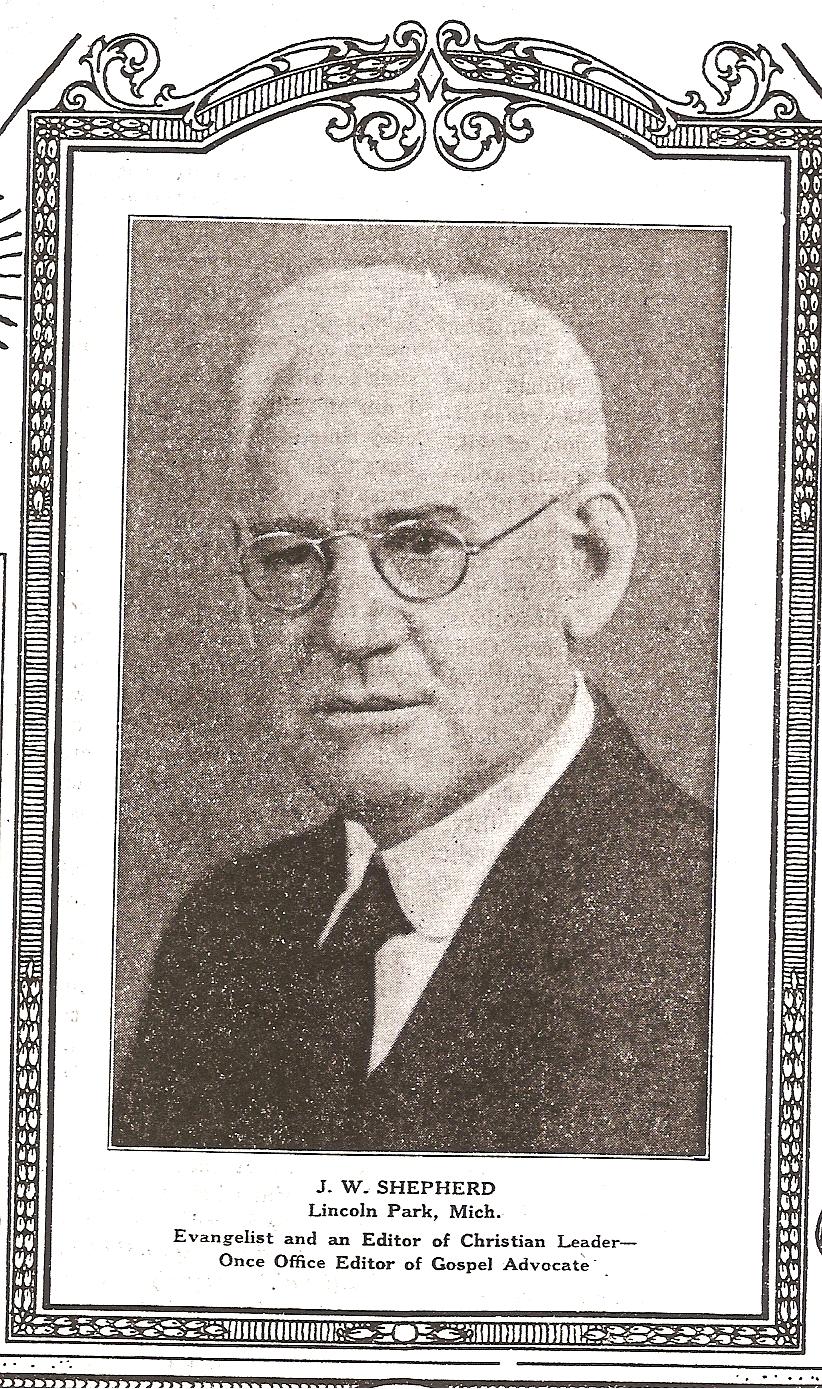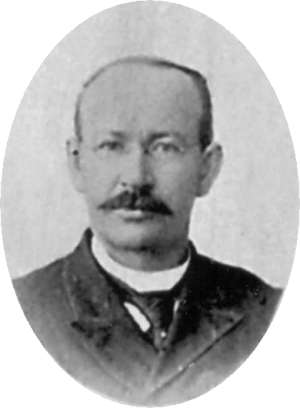Views on the Nature of Grace
by Bruce Daugherty
The emphasis on man's obedience in salvation overshadowed trust in the work of Christ in the mind K. C. Moser. Moser wrote, "Christ does not save by setting before man a perfect example and demanding that man follow him. Neither does he save by giving him a law and demanding perfect obedience. In either case his death would be void. Christ saves by His death on the cross." (Moser, 823).
What was the understanding of the Christian Leader editors, writers and preachers concerning the nature of grace? Did they show an appreciation for the gospel of grace? Or did they emphasize "a plan of making men righteous?" The answer to this question varies due to whether one believes grace includes the obedience of faith. The denominational "grace only" understanding grew out of the Calvinistic need for a direct operation of the Spirit to overcome man's total depravity. As the Restoration movement encountered Calvinism, the focus of investigation into salvation dealt with man's role in salvation, as per Acts 2:40 - "save yourselves from this perverse generation."
In general, the men examined here continued an approach that appealed to the Biblical passages emphasizing man's response to the work of God in Christ. Both they and their religious neighbors accepted the fact that salvation was God's gracious initiative in man's salvation. They differed however, in how that salvation was enjoyed by man. This "reactionary" type of preaching emphasized what they saw as needing to be corrected in their denominational neighbors.
J. W. Shepherd was the former office editor of the Gospel Advocate and a close collaborator with David Lipscomb and E. G. Sewell. In one of his early articles in the Christian Leader, Shepherd quoted Titus 2:14 and then stated, "From this and other passages, it is clearly taught that Jesus Christ came to this world to redeem man from sin; but while this is so, only those who accept the terms of mercy are redeemed." (Shepherd, 9). Shepherd affirmed the truth that Christ was the Savior, but the blessing of salvation was for those responding in obedience, rather than those who were trying to justify their own actions. Shepherd went on to say: "God made an offer through Jesus Christ and man must accept the offer. It is to all and for all, but only those who accept the offer become the recipients of the merits of Christ's shed blood. They become the ransomed, the redeemed, the rescued." (Ibid.). For Shepherd, this underlined the importance of the Church as they are the ones who have accepted God's offer of mercy through Christ.

An early article by Leader editor Ira Moore was written to counter denominational teaching concerning the need for a divine operation to overcome man's sinful nature. Moore declared, To be saved from sinning and sin, men must be taught that which is right, and encouraged to do what they know they ought to do." (Moore, Power, 4). Moore continued his explanation. "The Gospel does not save men by pardoning or forgiving them of their sins and iniquities. It is not a divine being with a will, laws and penalty; but it is the will of God expressed, and tells what the sinner must believe and do in order thaty he may be pardoned, saved, or forgiven by Jehovah, the Author of the Gospel with all its commands, threatenings, instructions and promises." (Ibid.). Moore gave an example of a recent message that a Methodist preacher had given converning the "converting a sinner from the error of his way" (James 5:19-20). "In the discourse he said that souls were being saved where the name of christ had never been heard or known, and where the Gospel had never been preached or heard of, and where no missionary had ever gone. The Holy Ghost, he said, was going to those people in dense heathen darkness and saving them." (Ibid.). Moore deduced that the Holy Spirit "must have saved them, if at all, without the Gospel; for no one can preach the Gospel without telling the beautiful story of Jesus and His sacrifice that men might be saved. But such work as that will not harmonized with the teachings of Jesus and Paul regarding the power of God to save." (Ibid.). Moore's article did not speak of grace, or the cross, but it did say that the gospel told the "beautiful story of Jesus and His sacrifice." It was reacting to the Calvinistic position of the Methodist preacher and countering a false idea that man was not capable of responding to teaching.
In another editorial, Moore explained Christianity to his readers. This editorial leans heavily toward a rationalistic understanding, as he explained that the doctrine of Christ is "the revelation of a divine system which is necessary to the salvation of men." (Moore, Christianity, 4). Moore decried "The growing indifference to doctrine, which is in evidence in many places, is a bad omen." (Ibid.). But not only was Christianity a doctrine, it was also a way of life. Moore compared it to an individual who was in debt at the grocer's. His account is not settled just because he promises to pay futre bills promptly. The old debt must be settled before a new start could be made without the guilt of the old debt. "It requires the blood of Christ, the great sacrifice, to clean on of the guilt of past sin. And any act in or out of water that does not bring the sinner to the blood of Jesus, is empty and useless." (Ibid.). While Moore's article again did not use the word grace, he makes it very clear that the blood of Christ is the agent of salvation.

Later, Moore replied to the charge made by Baptist preacher Ben Bogard that baptism was a work which repudiated Ephesians 2:8. Moore stated that Bogard's charge in the Baptist and Commoner, could only apply if "Paul means to call baptism a work." (Moore, Bogard, 4). Moore pointed out the meaning of grace. "Since 'grace' is favor, Jehovah may require many acts of obedience on the part of the alienated sinner before Jehovah would pardon or save him, and still the salvation would be 'by grace through faith'." (Ibid.). Moore pointed out that Bogard had to read into Ephesians 2:8-9 that baptism was a work. But this would mean that Paul was contradicting Peter, who declared, "Baptism doth also now save us" (1 Pet. 3:21). Moore did not believe that the Bible carried such a contradiction. He also believed that baptism was not a work of any kind, especially the kind Paul was referring to in Ephesians. Moore continued to explain how grace could include terms of obedience. "It is but a gracious favor that God has extended to sinful men that they may be saved on such easy terms as believing in Christ, repenting of their sins, and being baptiszed unto the remission of their sins, as the Holy Spirit told the thousands on the day of Pentecost to do. There is no 'work' that any one can do that will benefit God and put Him under obligation to give him a place in heaven." (Ibid.). Moore pointed out that salvation was all about trusting in what God had done through His Son. "It is only by the grace of God that our believing in His Son Jesus is counted anything to our credit by Him; that our repentance and baptism count for anything in changing our relationship to God, that He will accept us into His kingdom as forgiven rebels or aliens on conditions that a repentant sinner is baptized." (Ibid.).
In an early article, T. Q. Martin linked salvation to obedience to the condtions required by Jesus. "We must offer either a human or a divine remedy for sin, and this divine remedy is in the Gospel . . ." (Martin, Dynamic, 5). But these conditions were based on the truth of "Jesus and he crucified" which Martin believed were the "center and circumference" of the writings of the Apostle Paul. Martin noted Paul's statement from Romans 1:16, where the Aptlse was not "ashamed of the Gospel." He then contrasted that to the preaching of men who: ". . . are ashamed to quote the requirements of our dear Lord and Savior to the alien sinner in order that he may have the blessing of sins forgiven and enter upon a new life." (Ibid.). For Martin, the saving message of Christ included the terms Christ gave for salvation.

In two articles entitled, "The Doctrine of the Cross" T. Q. Martin wanted his readers to grasp the meaning of the cross. Eloquent preaching describing details of the crucifixion was powerless, in Martin's view, if it did not convey the truth that "the sinless Son of the living God, the representattive of the whole human race, dying for sinful men, that God might be just while justifying those who believe in Jesus." (Martin, Doctrine 1, 5). In referring his readers to Romans 3:21-26, Martin wanted thm to note several things: " 'Righteousenss of God,' not man's righteousness; 'justified freely by his grace,' it is a gracious, not a meritorious justification. Notice that 'the redemption that is in Christ Jesus' clearly implies that there is no redemption for man out of Crhist Jesus. Do not overlook the expression 'in his blood'." (Ibid.). Clearly, Martin is establishing that salvation was based on Christ's atonement on the cross. Martin went on to share with the readers a few of the many New Testament passages setting forth the doctrine of the Cross: 1 Jn. 2:1-2; 1 pet. 2:24; Gal. 1:4; 1 Cor. 15:3. The conclusion that Martin wanted his readers to reach regarding the doctrine set forth in these passages was that "upon the atoning death of Christ is man's only hope of remission of sins." (Ibid, 5-6). Martin's editiorial addressed those who believed that by preaching baptism as a condtion of remission of sins, this was placing salvation dependent on man's works. This in his view, was a failure to distinguish between the grounds of salvation and the condtions of salvation. Salvation is grounded on what God has done through Christ, but reception of that blessing was conditioned on doing what God had appointed. Martin quoted Mark 16:15-16 and said, "Now what do I say to the world when I humbly, trustingly, go down into the water and am immersed and raised up? Do I say, 'Behold me as I demonstrate to you a way of savation devised by man's wisdom, and carried out in the wisdom of man, entitiling him to remission of sins?' A thousand times no. But I do say, 'I come by faith and in humility to Jesus Christ who died that I might live. . . . I submit, in faith to this which he has apppointed, tht my trusting heart may rejoice in the fulfillment of his promise'." (Ibid, 6).
Martin's second article spoke of the offensiveness of the cross. Just as teh preaching of the cross was offensive in the days of the apostles (1 Cor. 1:23-24; Gal. 5:11); to preach Christ "faithfully has been, is and will continue to be, a stumbling block, an offense, to all save those who are 'poor in spirit'." (Martin, Doctrine 2, 4-5). Why was this so? Because the offense of the cross continues in that it destroys all man's hope of meritorious salvation, it put the whole human family on a common level, and it required the same thing of all men regarding their justification. He concluded, "This may be against our pride, our feeling of self-sufficiency, but we must come, or not at all." (Ibid, 6). Martin elaborated on how salvation could be by grace and have conditions as he explained Ephesians 2:8-9 for a reader. "Salvation is a gift of God, and a gift implies a giver and a receiver. Giver and receiver in connection with gift, necessarily implies reception, and reception is a condition. There can be no such thing as an unconditional gift. Certainly there can be an unmerited gift, and such a gift is salvation from sin. There is no merit in my believing, repenting, or being baptized. My salvation is grounded upon what God does; it is conditioned upon what I do." (Martin, Ephesians, 5). In an article contrasting the systems of men with the word of God, Martin again spoke of salvation. "Our redemption, forgiveness of sins, salvation is in Christ." (Martin, Theology, 5). But Martin again pointed out the link between trusting in the saving work of Christ and Christ's terms of obedience. "In the light of the Holy Spirit's teaching in God's own holy word, we are led to turn away from sin and to trust Jesus Christ for salvation. But no matter how long we may have believed that Jesus has the power to save us, we cannot intelligently trust him for salvation until, surrendering our own will, we meet the plain, simple requirements that he has made of us, and one of these requirements is that we be baptized." (Ibid.). Martin concluded his article by asking: "When one with a childlike faith in Jesus, having turned away from all sin, comes to the water of baptism, in whom is he trusting? To whom is he looking for salvation? He is certainly not trusting in himself for well he knows he had nothing to do with originating the command. He is not trusting the preacher, for too many preachers would dissuade him from taking that step, manifesting his faith in, and his willingness to trust the author of the command for salvation from sin. Upon whom is he leaning? In whom is he trusting? Upon whom is he calling for salvation? Upon Jesus, the Christ, the author and finisher of our faith. 'Arise and be baptized, and wash away thy sins, calling on his name'.(Acts 22:16)." (Ibid.).
Like the other Leader editors and writers, Flavil Hall also pointed out the link between trusing Christ and obedience to the terms of salvation. After pointing out God's provisions in nature for man's material necessities and the condtions imposed on man to receive the benefits of those provisions, Hall made his point. "So it is in the spiritual creation. God through hs Son has provided salvation from sin, the bread of heaven, the water of life and spotless raiment for the fallen sons and daughters of Adam's race. But the acquirement of these is made possible only by compliance with the divinely imposed conditions . . . " (Hall, Nature, 6). In his later years, Hall would write: "The salvation is wholly by grace through the atoning blood of Jesus, but it is appropriated by man in surrendering to Jesus in the 'obedience of faith'." (Hall, Pearls, 41). 'The obedience of faith' was a theme that Hall had proclaimed in his hymn, 'Come in the Obedience of Faith' which he had written in 1910. The chorus after the third verse states: "Come believing and repenting, and obey Jehovah's word, Be baptized into His kingdom and be saved through Jesus' blood." (Hall, Song, 188).

Thad Hutson offered the "simple plan of salvation" to his readers. "Preach the Gospel, teach the people, let them believe the Gospel, repent of their sins, and be baptized by the authority of Christ into the name of the Father, and of the Son, and of the Holy Spirit for the remission of sin and be saved." (Hutson, March, 4). Hutson's aricle did not mention what God had done in Christ to bring this plan to men. However, a month later Hutson pointed out the confession of faith that saves men: "Faith in Jesus Christ as the Son of God, the Savior of men, the divine One: this is the confession of faith." (Hutson, April, 9). Hutson elaborated on the implicatons of this confession. "To believe with all our hearts is to accept all his teachings, obey all of his commandments, and confidently rest in all of his promises." (Ibid.). But Hutson believed that men had tampered with the gospel message by requiring many other things to be believed. Hutson declared that though men required additional beliefs, these were not essential. In contrast, "But faith in Christ is always essential. No one can be saved without it." (Ibid.). While Hutson, no doubt was countering denominational objections to the conditions of salvation, he also was cognizant of and emphasized trusting in Christ. The completeness of Christ for salvation and motivation to Christian living was brought out in Paul's letter to the Colossians 3:11, "But Christ is all and in all." After noting how the original statement was given in the context as to how Christians should treat one another, Hutson spoke of the completeness of Jesus for savlation. "In Him alone is the merit of works. Not our works, but His." (Hutson, September, 1). He also declared that it is "Christ who justifies the believer." (Ibid.).

Later, Hutson noted a charge that was being made against some older preachers. Because they had emphasized baptism so much, they were accused of making it a hobby. The accusers, according to Hutson, declared, "They so unduly emphasize baptism that many look at the water and never see any further." The result was a "dipped and be done doctrine." (Hutson, Older, 10). While Hutson defended older preachers for holding the line against denominational attacks on the necessity of baptism, he admitted "There may be a grain of truth in this charge." (Ibid.).
There is no doubt that the editors and writers of the Christian Leader placed emphasis on the conditions of salvation as they reacted to the teachings of the denominational groups of their day. Yet, while they argued strenously for the conditons of salvation, they acknowledged that these were based on trusting in the work of Christ on the cross. It would be difficult to argue that they differed significantly from earlier preachers like Lipscomb on grace. They denied a salvation based on meritorious works even as they emphasized obedience to the terms of the gospel.
Works Cited
Hall, Flavil J. "Field Notes and Helpful Thoughts - Conditions in Nature and Grace" Christian Leader 35 (Apr. 12, 1921):6.
_________. Pearls of Grace and Glory. Privately published, 1950.
_________ and S. H. Hall. The Gospel Message in Song. Cincinnati: F. L. Rowe, Publisher, 1910.
Hutson, Thad. "Considerations" Christian Leader 32 (Mar. 12, 1918): 4.
__________. "Considerations" Christian Leader 32 (Apr. 30< 1918):9.
__________. "Considerations" Christian Leader 37 (Sept. 11, 1923):1.
__________. "Considerations - Old and Older Preachers" Christian Leader 50 (Jun. 9, 1936):10.
Martin, T. Q. "The Dynamic Message" Christian Leader 33 (Jan. 14, 1919):5, 8.
__________. "The Doctrine of the Cross, 1" Christian Leader 42 (Oct. 2, 1928): 5-6.
__________. "The Doctrine of the Cross, 2" Christian Leader 42 (Oct. 16, 1928): 4-6.
__________. "Ephesians 2:8-9" Christian Leader 45 (Oct. 20, 1931):4-5.
__________. "Theology Versus God's Word" Christian Leader 51 (Sept. 28, 1937): 4-5.
Moore, Ira C. "The Power of God to Save," Christian Leader 31 (Apr., 24, 1917): 4-5.
__________. "Christianity" Christian Leader 35 (Jan. 25, 1921): 4.
__________. "Some Baptist Bogard Brilliancy" Christian Leader 44(Apr. 29, 1930):4-5.
Moser, K. C. "The Fundamental Doctrines of Christianity," Gospel Advocate 75 (Aug. 31, 1933):823.
Shepherd, J. W. "Redemption from Iniquity" Christian Leader 29 (Nov. 9, 1915):9.
